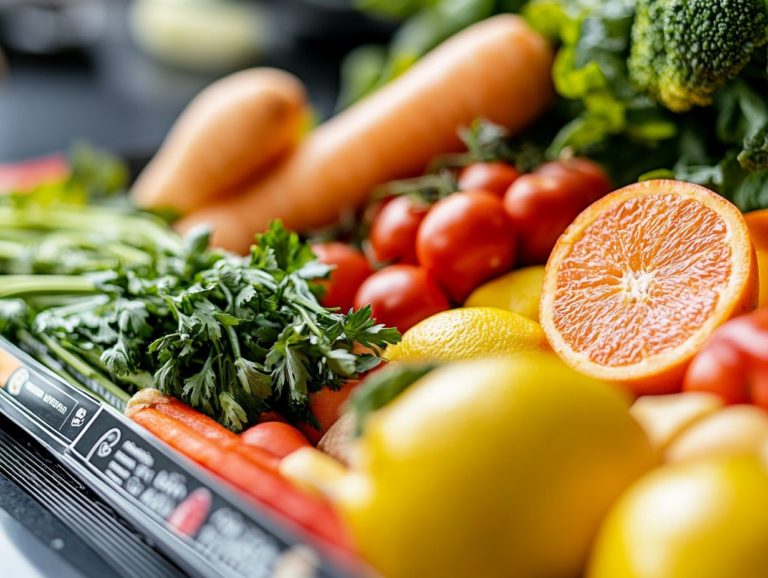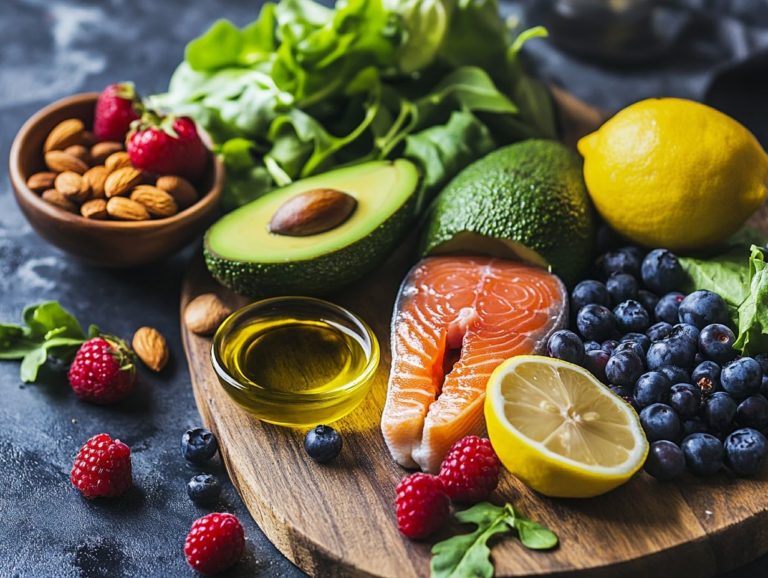What Is the Role of Fiber in Digestion?
Digestion is a complex process that plays a vital role in your overall health. Fiber is a key player in this system.
By understanding digestion and the functions of fiber, you can make informed dietary choices that benefit your well-being.
This article explores how fiber influences digestion, highlights the advantages of incorporating sufficient fiber into your diet, and breaks down the two types of fiber: soluble and insoluble.
You ll discover practical strategies to boost your fiber intake while being mindful of the risks associated with both excessive and insufficient fiber consumption.
Learn how to optimize your digestive health through thoughtful fiber consumption!
Contents
Key Takeaways:
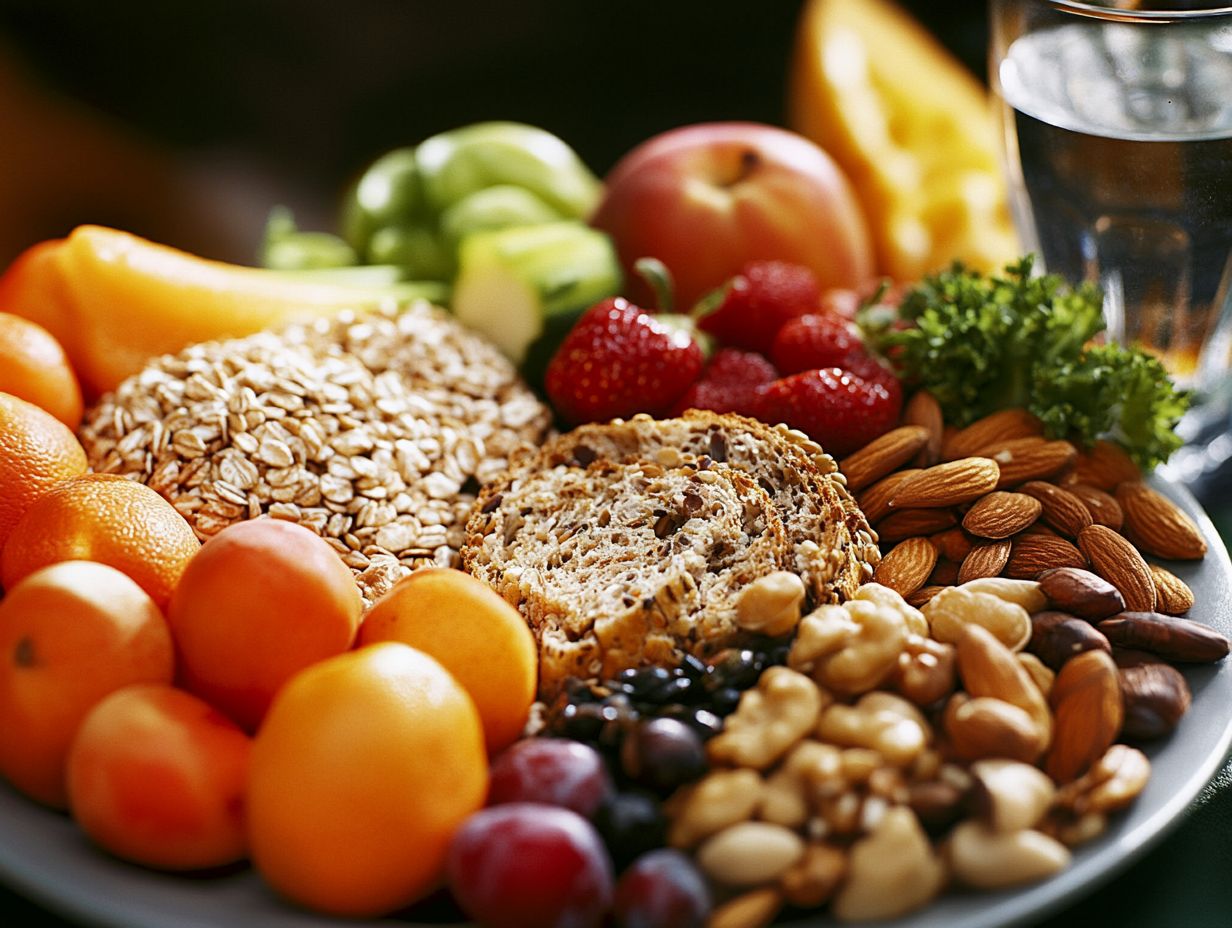
Fiber plays a crucial role in digestion and overall digestive health. It helps regulate bowel movements, promotes a healthy gut microbiome, and reduces the risk of chronic diseases. There are two types of fiber: soluble and insoluble, each with unique roles in digestion. Soluble fiber slows digestion, while insoluble fiber aids in regularity. The recommended daily fiber intake is 25-30 grams for adults, but many people fall short of this goal. Incorporating more whole foods, fruits, and vegetables into your diet can increase fiber intake and improve digestion.
Understanding Digestion and Fiber
Digestion reveals how your body breaks down food, absorbs vital nutrients, and eliminates waste. Dietary fiber plays an essential role in supporting digestive health and overall well-being.
This fiber, composed of both soluble and insoluble types, is crucial for maintaining bowel health, easing constipation, and potentially reducing cancer risk.
It also supports a healthy gut microbiome, which is the community of good bacteria in your stomach. By understanding digestion, especially in relation to fiber, you can appreciate its numerous health benefits.
What is Digestion?
Digestion is an interesting process that transforms the food you consume into essential nutrients and energy while facilitating waste elimination.
This journey begins in your mouth, where chewing breaks down food and enzymes in your saliva start chemical digestion.
As food travels down your esophagus to your stomach, it mixes with gastric juices that enhance nutrient absorption.
The small intestine absorbs most nutrients, aided by bile and pancreatic enzymes.
By the time the remnants reach your large intestine, your digestive system extracts any remaining water and prepares waste for elimination.
Maintaining a balanced diet is essential to ensure this process functions smoothly, providing your body with necessary vitamins and minerals.
What is Fiber?
Fiber is an important type of carbohydrate that your body cannot digest, yet it plays a crucial role in your digestive health. It comes in two main forms: soluble fiber and insoluble fiber, each offering distinct health benefits.
Soluble fiber dissolves in water, turning into a gel-like substance that helps regulate blood sugar levels and lower cholesterol. Insoluble fiber contributes to stool bulk and promotes regularity.
Consider adding these fiber-rich foods to your diet:
- Fruits like apples and oranges
- Vegetables such as broccoli and carrots
- Legumes including beans and lentils
- Whole grains like oats and quinoa
Consuming these foods supports healthy digestion, aids in weight management, reduces the risk of chronic diseases, and contributes to heart health. A high-fiber diet is essential for optimal nutrition.
Start incorporating more fiber into your meals today for better health!
Why Fiber is Essential for Your Digestion
Fiber is a key part of a healthy diet. It influences your digestion significantly. A high-fiber diet can help you stay regular and improve your overall health.
It promotes regular bowel movements and enhances digestive health while offering benefits that support your well-being. Embracing fiber-rich foods can alleviate constipation and support bowel health by nurturing healthy gut bacteria those good bacteria in your stomach that help with digestion.
Understanding the role of dietary fiber helps you make better health choices that lead to improved digestive outcomes.
How Fiber Helps Your Digestion
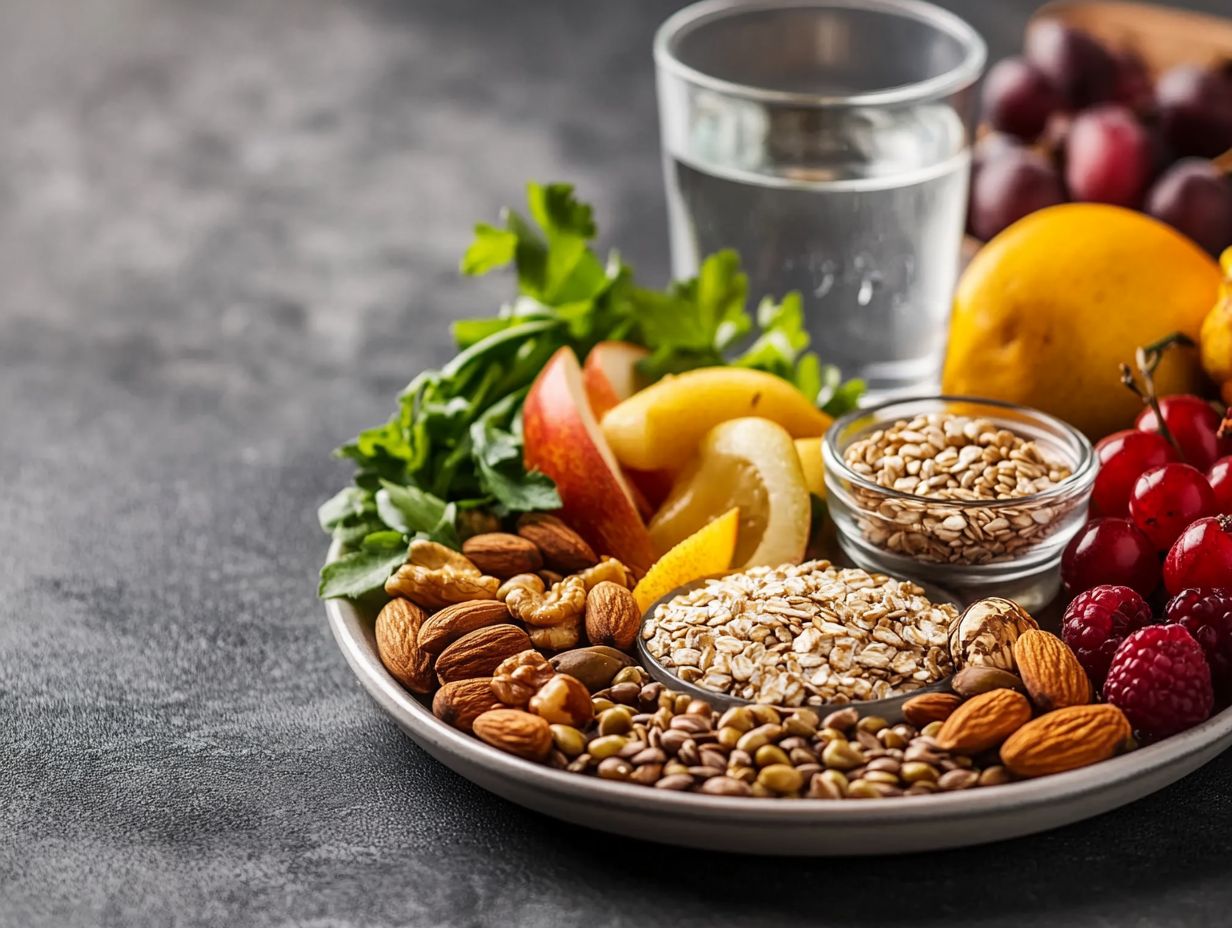
Fiber plays a vital role in digestion, influencing bowel movements, enhancing nutrient absorption, and nurturing a healthy gut microbiome, all of which promote your overall digestive health.
The two primary types of fiber soluble and insoluble each serve unique functions.
- Soluble fiber dissolves in water, transforming into a gel-like substance that slows digestion. This process aids in absorbing essential nutrients and stabilizes blood sugar levels.
- Insoluble fiber adds bulk to your stool, facilitating its passage through the intestines and helping to prevent constipation.
By incorporating a balanced mix of both types of fiber into your daily meals, you can boost your regularity, maintain a healthy weight, and reduce the risk of chronic conditions, ensuring that your digestive system operates at its best and enhances your overall well-being.
Benefits of Adequate Fiber Intake
Adequate fiber intake ties to numerous health benefits, including lower cholesterol levels, effective weight management, stable blood sugar levels, and a diminished risk of certain cancers.
Research shows that fiber is crucial for your health, particularly in promoting heart health through cholesterol regulation especially with soluble fiber found in oats and beans. By adding fiber-rich foods like whole grains, legumes, fruits, and vegetables to your diet, you enhance satiety, making it easier to manage calorie intake.
Diversifying your fiber sources helps stabilize blood sugar levels, which is a key advantage for those managing diabetes. Studies reveal that individuals who embrace a high-fiber diet face a significantly lower risk of developing colorectal cancer, highlighting the protective effects that dietary fiber offers.
Types of Fiber and Their Roles
The two primary types of dietary fiber soluble and insoluble serve unique functions within your health and digestion, each offering distinct benefits through various sources like fruits, vegetables, legumes, and whole grains.
Soluble fiber, which you can find in foods such as oats and beans, is great for lowering cholesterol levels and stabilizing blood sugar. Insoluble fiber, found in whole grains and nuts, plays a crucial role in promoting regular bowel movements and enhancing digestive health.
By grasping the differences between these fiber types, you can make informed dietary choices that will optimize your overall well-being.
The Differences Between Soluble and Insoluble Fiber
Soluble and insoluble fibers each play distinct roles in your body. Soluble fiber dissolves in water to create a gel-like substance that aids in lowering cholesterol. Meanwhile, insoluble fiber adds bulk to your stool, promoting regular bowel movements.
Understanding this difference is key to appreciating how each type contributes to your overall health. Soluble fiber, commonly found in foods like oats, apples, and beans, can help regulate blood sugar levels and may even support heart health by reducing bad cholesterol.
On the flip side, insoluble fiber plentiful in whole grains, nuts, and vegetables such as broccoli and carrots plays a crucial role in digestive health by enhancing gut motility.
Incorporating both types into your high-fiber diet is essential for a balanced approach to nutrition, ultimately leading to improved long-term health outcomes.
Start adding more fiber to your meals today for a healthier tomorrow!
How Each Type Affects Digestion
Each type of fiber plays a distinct role in your digestion. Soluble fiber slows down the digestive process and helps stabilize blood sugar levels. Insoluble fiber promotes bulk and regularity in bowel movements, contributing to your overall digestive health.
Soluble fiber is found in delightful foods like oats, beans, and apples. It forms a gel-like substance in your gut, aiding in the gradual absorption of sugars and creating a satisfying sense of fullness, which is beneficial for weight management.
In contrast, insoluble fiber is abundant in whole grains, nuts, and vegetables. It increases stool bulk and facilitates smooth passage through the intestines, helping to prevent constipation.
This interaction between soluble and insoluble fibers ensures your digestive system operates efficiently. It minimizes the risk of disorders like diverticulitis and irritable bowel syndrome while enhancing nutrient absorption from various food sources.
How to Incorporate Fiber into Your Diet
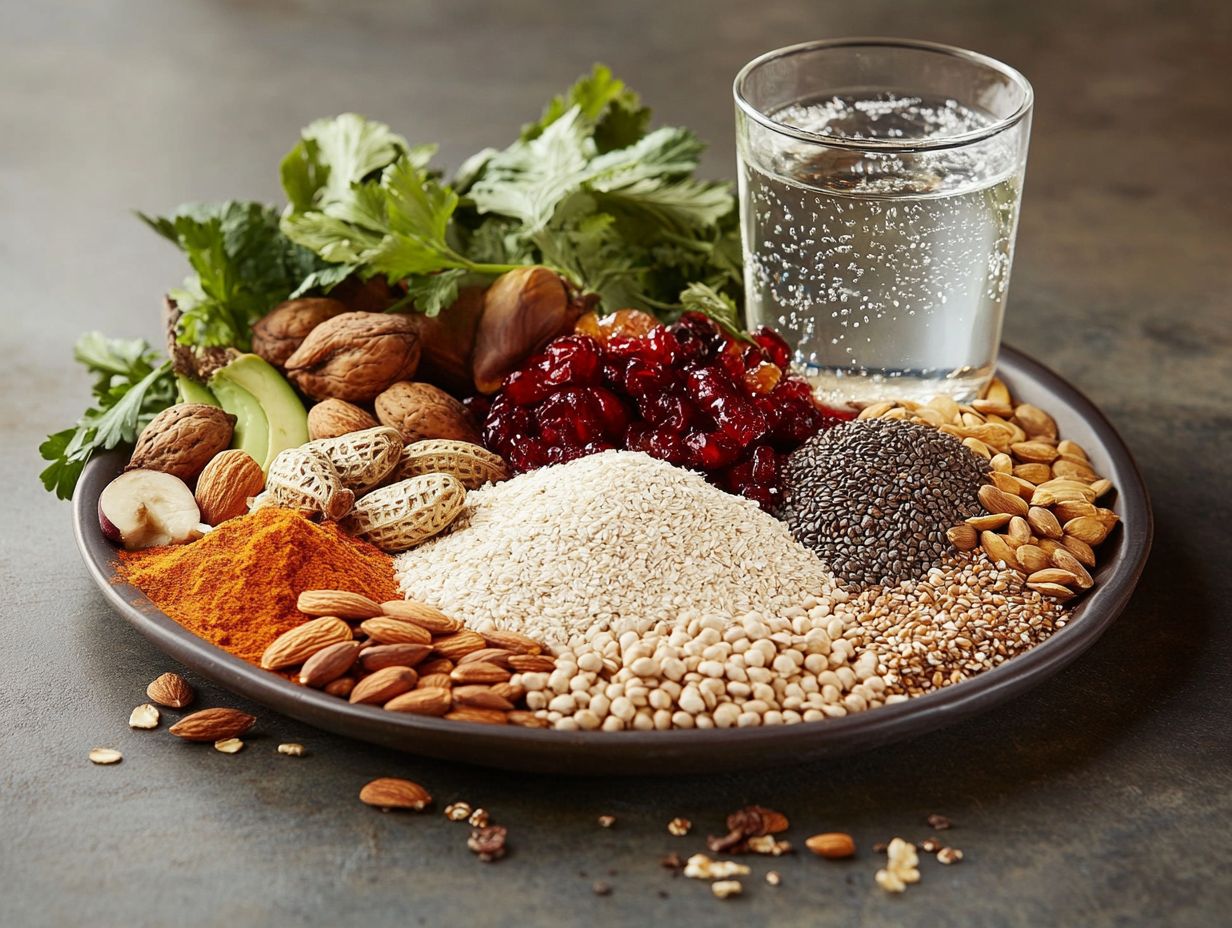
Incorporating fiber into your diet is vital for achieving the recommended daily intake. You can easily do this by embracing a variety of fiber sources like fruits, vegetables, legumes, and whole grains.
This high-fiber approach promotes better health and enriches your overall well-being. By mastering the art of integrating fiber-rich foods into your daily meals, you can significantly boost your digestive health while reaping additional benefits.
Following health recommendations from reputable organizations will enable you to meet your fiber goals. Start your fiber journey today for a healthier tomorrow!
Recommended Daily Intake
The recommended daily intake of fiber varies by age and gender. Generally, around 25 grams for adult women and 38 grams for adult men supports optimal digestive health.
These guidelines, established by reputable health authorities like the Institute of Medicine, are designed to enhance digestion and elevate your overall well-being. This lowers the risk of chronic diseases such as heart disease and diabetes.
To determine if your fiber intake meets these recommendations, consider keeping a food diary or utilizing nutrition apps that track your daily consumption effortlessly.
If you find yourself needing to boost your fiber intake, now is the perfect time to add more fiber-rich foods to your meals. Fruits, vegetables, whole grains, and legumes can seamlessly fit into your daily routine, helping you achieve your health goals.
Ways to Increase Fiber Intake
You can effortlessly boost your fiber intake by incorporating more fiber-rich foods into your diet. Think fruits, vegetables, legumes, and whole grains these are the cornerstones of a high-fiber lifestyle.
By making small yet impactful adjustments, like tossing beans into salads or indulging in fresh fruits as snacks, you can elevate your daily fiber levels. Opting for whole grain products instead of refined ones adds texture and enhances the nutritional profile of your meals.
Just remember to gradually ramp up your fiber consumption to avoid any potential digestive discomfort. Keeping a food diary can help monitor your fiber intake, while consulting dietary recommendations will assist you in crafting personalized strategies for optimizing your nutrition.
Potential Risks of Too Much or Too Little Fiber
While fiber is vital for maintaining optimal health, it’s important to recognize that both excessive and inadequate intake can lead to potential risks.
Overindulging in fiber may result in digestive discomfort, constipation, or even gastrointestinal blockages. Conversely, not consuming enough fiber can lead to a range of health issues.
Balancing your fiber intake is key to reaping its numerous benefits without inviting unwanted complications.
Side Effects of Excessive Fiber Intake
Too much fiber can cause discomfort like bloating, gas, and cramps. It can even lead to blockages, especially if you increase fiber intake quickly and don’t drink enough water.
Gradually add fiber to your diet. This helps your digestive system adjust smoothly.
Always drink plenty of water with fiber-rich foods. This helps digestion and reduces discomfort.
Mix different fiber sources! Balance soluble and insoluble fibers to prevent constipation and diarrhea.
Track your fiber intake with meal planning! This helps you manage your daily consumption and supports a healthier diet.
Consequences of Inadequate Fiber Intake
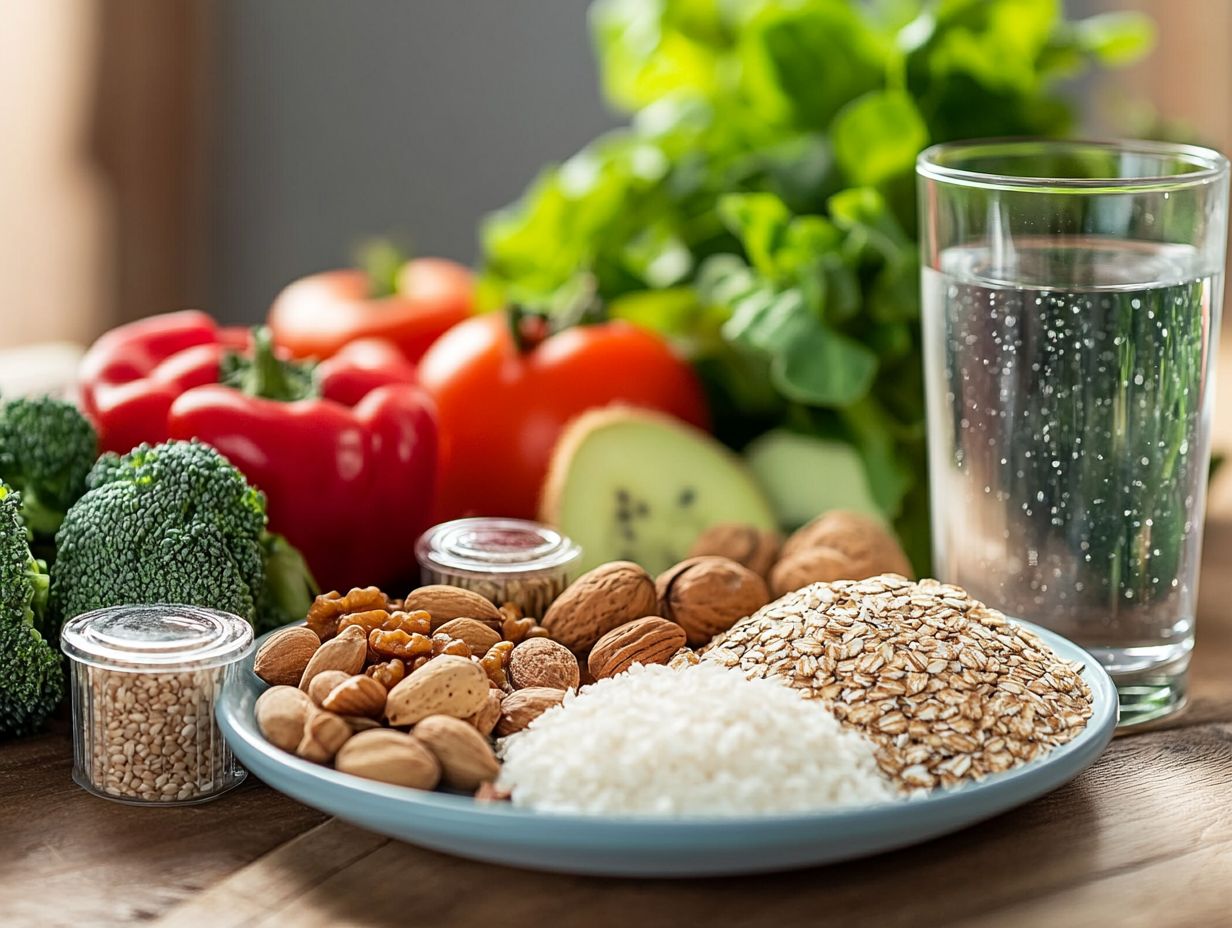
Not getting enough fiber can cause health problems like constipation and digestive issues. It also raises your risk of chronic diseases such as heart disease and cancer.
A lack of fiber can make it hard for your body to have regular bowel movements, leading to discomfort and bloating.
Low fiber intake can upset your gut bacteria balance, which is important for your health.
Track your daily intake of fruits, vegetables, whole grains, and legumes. This gives you a clearer picture of your fiber consumption.
Frequently Asked Questions
What Is the Role of Fiber in Digestion?
Fiber plays a crucial role in digestion by promoting regular bowel movements and preventing constipation, highlighting the significance of dietary fiber in our diet.
How does fiber aid in digestion?
Fiber helps digestion by adding bulk to stools, making them easier to pass. It also keeps your colon clean.
What types of fiber are beneficial for digestion?
Soluble fiber, found in foods like oatmeal and apples, helps slow down digestion and increase feelings of fullness. Insoluble fiber, found in foods like whole grains and vegetables, promotes regular bowel movements.
Can fiber help with digestive issues?
Yes, fiber can help with various digestive issues, including constipation, diarrhea, and irritable bowel syndrome. It also helps regulate blood sugar levels and lower cholesterol.
How much fiber should I consume daily for optimal digestion?
The recommended daily intake of fiber is 25 grams for women and 38 grams for men. Gradually increasing fiber intake and drinking plenty of water is important to avoid discomfort.
What are some good sources of fiber?
Fruits, vegetables, whole grains, legumes, and nuts are excellent sources of fiber. Incorporate a variety of these foods into your daily diet for optimal digestion.



